 Alec Ash returned to Britain last month after spending the last 10 years in China. The great ship of the Chinese state can take forever to turn an inch, but at times a sea change can happen in an instant. This week, Beijing announced 10 new measures to “further optimize the COVID-19 response,” including less mandatory health-code scanning, an end to mass testing, and fewer lockdowns and quarantines. In short, zero-COVID may be over. For those hundreds who protested publicly against pandemic policy a fortnight ago — and the hundreds of thousands who sympathized silently — it is a relief. Indeed, this may embolden some who feel the government U-turn was in response to street action, although it was clear the economic cost of zero-COVID meant a change this year was likely. There are others who are not sure opening is a good idea, though. They are mostly in rural areas — where I lived for the past three years researching a book — and were less affected by urban lockdowns, seeing China’s zero-COVID policy as a point of pride. The elderly are also frightened of getting sick, after years of propaganda telling them to fear the virus. This divide was apparent even on the “wailing wall,” as the comments section of the Weibo account of Dr. Li Wenliang — China’s original COVID-19 whistleblower — is known. “Today we’re starting to re-open,” posted one netizen. “This may not necessarily be a good thing, but our country tried its best.” Another replied: “This farce is almost over. … The best I can do is vow not to forget, and not to forgive. Rest in peace.” |